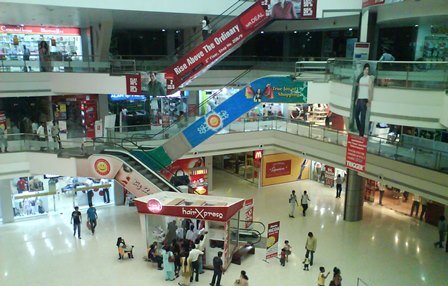ASSOCHAM report finds that mall space in Mumbai and other metros has dropped by 30% rental value with lower footfalls.
by The Editors | editor@themetrognome.in
Rising inflation and higher living costs have taken a toll on our favourite pastime: shopping. Tighter budgets are prompting many Indians to stay away from shopping malls. This has resulted in lower footfalls and high losses for retailers. On the other hand, if you are looking to buy shop space in a mall, now might be a good time to do it.
As per a new study published by ASSOCHAM (Associated Chamber of Commerce and Industry in India), a “slowdown in consumer footfalls, coupled with online shopping that provides convenience of delivery at door steps, have led to troubles for the shopping malls which are suffering 20 to 25% vacancy rates and 30% drop in rentals in the last one year.” The study finds that this trend runs parallel to a global one, where declining footfalls in retail space in over 200 shopping malls across the US, UK and other countries has lowered commercial space rentals. In the US, the malls are facing 46% vacancy rates whereas malls in UK are impacted by 32%.
“On the other hand, the Indian e-commerce industry appears to be unaffected by the demand slowdown and is likely to clock a compounded annual growth rate (CAGR) of 35% and cross the $100-billion mark in value over the next five years,” the study finds, pegging the e-commerce industry in India presently at $17 billion.
Continuing on the strong growth momentum of 2015, the e-commerce industry is estimated to see a 72% increase in the average annual spending on online purchases per individual in 2016 from the current level of 65%, the study said. Online shopping mainly focusses on purchasing electronics, books, music, apparel, sporting and outdoor goods.
“It is true that the online shopping has shown handsome growth while the brick and mortar malls are witnessing slowdown. It looks that the growth in e-commerce looks impressive because of quite a low base and increasing penetration of internet,” ASSOCHAM Secretary General DS Rawat said. “The brick and mortar outlets on high streets and inside malls are trying to hold on through lower prices and deals. In India, sales in shopping malls have dipped by 25 to 30% and footfalls by 15 to 20% compared to the same period last year.”
There were around 50 operational malls in 2005, a number that rose to 610 in 2015 in top 10 cities. Additionally, with improvement in infrastructure such as logistics, broadband and Internet-ready devices, there is likely to be a significant increase in the number of consumers making purchases online, the study said. It estimates around 65 million consumers in India to buy online in 2015, as against around 40 million in 2014.
“The challenges of suburban sprawl, worsening automotive traffic, rising fuel prices and the increased difficulty of time management in modern families have made going to the mall a planned activity,” adds the paper.
Mobile technology is also having a huge impact on brick and mortar retail. Amazon recently reported that roughly 8 to 10% percent of their total sales are being generated by mobile devices, and expect this trend to continue upwards.
(Picture courtesy www.indiantravels.com. Image is used for representational purpose only)




